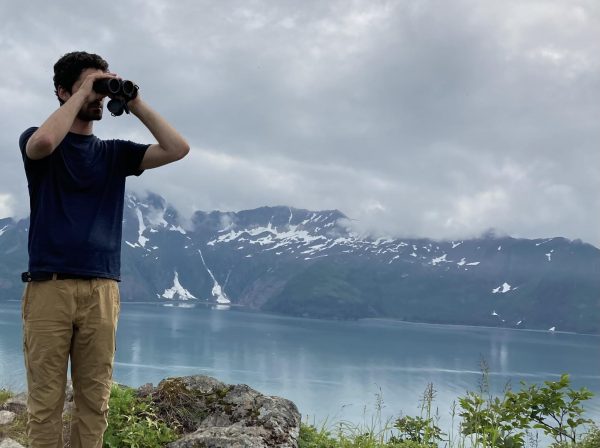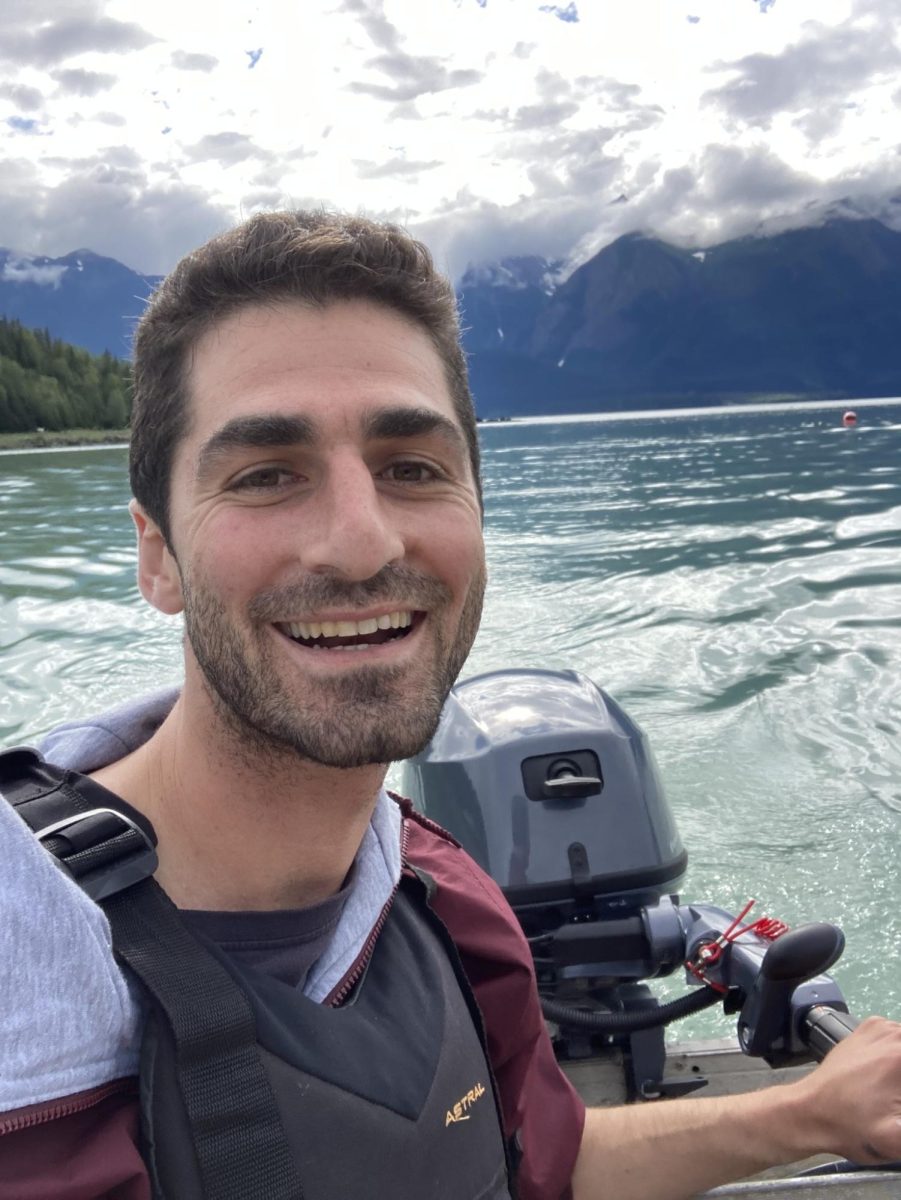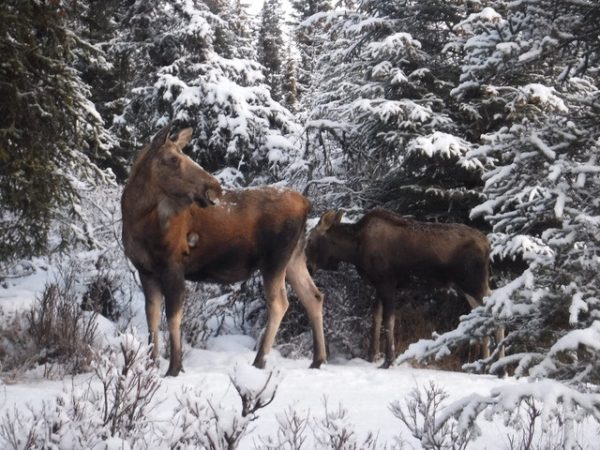East Rock Record reporters recently held a press conference with Max Muscatine Graham, a former East Rock Record mentor. Mr. Graham’s visit was courtesy of the first annual Abram Katz Visiting Science Journalist Press Conference. The program honors the late Mr. Katz, a long-time Science Editor at the New Haven Register. His Sunday column was called Gray Matters and was the favorite of many readers. He interviewed well-known scholars, doctors, and scientists regarding advancements in science and technology. He held a special ability to explain the complex inner workings of our world to the ordinary person. Mr. Graham is an environmental journalist based in the small fishing town of Homer, Alaska. He writes about food and agriculture for Grist, an online climate magazine.
Here are student reflections on the meeting:
Max’s presentation was interesting because he told us about marine heat waves, the Yukon River salmon shortage and moose. Marine heat waves are when a body of water has abnormally high temperatures. The Yukon River salmon shortage is happening because of a marine heat wave caused by climate change. Max told us how many moose roam around Alaska, and how once he saw a moose come up to a bookstore window and look at the display. That is what Max Graham, former ERR mentor, taught me. —By Haven Pickett
I am Alya Mikkelson, and I work for the East Rock Record. We got to interview Max Graham, a journalist in Alaska who studies salmon. I loved the ways that Alaska is different from New Haven, and I loved the way that he answered our questions. He also said so many facts that I never thought would be true. Like that moose kill more people than bears! He also said that he was in the East Rock Record four years ago. I want to be like him when I grow up. Other facts are like how in the winter, it can get dark at 3:00 PM! Alaska, according to Max is a very fun place to be. According to what he said, I kinda want to live Alaska as well! Just listening to the answers to my (and other people’s) questions, and how a lot of my anticipated answers were wrong was actually fun! For example, when I asked how many salmon types lived in Alaska, I thought the answer was more than 10. Boy, was I wrong! There were 5! It was so amazing to see myself be wrong! I learned more than just that. I could have sat there all day asking questions. We (the East Rock Record) got the chance to interview him. The sad things he told us, were things like how salmon shortages are happening because of greenhouse gasses warming the Earth, and because the oceans take in 90 percent of our heat, the oceans are suffering from climate change as well. I think that the interview was a huge info-giver in my life. (So far, at least!) —By Alya Mikkelson
Max Graham is a very outgoing individual which is needed in a journalist. And I also look up to him because he spent five days on a fishing boat with someone who was fishing and I think that is also super cool. I would also love to go to another state/country. His experience in Alaska was very interesting. The fact that he learned so much in three years is a very hard feat. —By Elias Plascencia
When I heard that moose just roam around in Alaska my mind was blown. I didn’t know that until Max Graham told me, wow. There are salmon shortages in Alaska. People in Alaska basically survive on salmon, so this is big!!! This is all due to global warming because it is warming up the lakes, rivers, oceans and more. —By Rafi Conroe
DID YOU KNOW that Alaska has over three million lakes and there are five types of salmon?! Now-a-days the oceans are warming up and the main source of food which is the salmon are losing their lives. Many people in Alaska are impacted by this. They don’t have as much food to eat now because the salmon population is decreasing. Also, DID YOU KNOW that Alaska has the world’s largest moose population and moose eat more food than black bears?! These moose in Alaska are the most fun and craziest animals because they look up in the windows of bookstores of even cars. Moose are not normally aggressive, however, they can become aggressive when they are harassed by people, dogs and traffic and when they are hungry and tired. Also, DID YOU KNOW that Alaska is home to 17 of North America’s tallest mountains and it has more than 100 volcanoes?! Alaska is a very beautiful and lovely place. But the only thing is that in the winter the sun rises at 10:00 am and sets around 3:30 pm, which according to me is horrible. Now, we know the beautiful place Alaska and the dangers occurring there. Hope this is informational! –By Jashwini Parthiban
Max Graham is a former East Rock Record mentor. Max now lives in Alaska where he works as a science reporter. He travels all over Alaska and other parts of the world to report on his stories. Sometimes there are no roads to get where he is going so he flies in. One of the things he writes about is salmon. Salmon is a major food source in Alaska, but because of climate change the cold seas that they normally live in are getting warmer. Whether for his work or just for fun he spends a lot of time hiking through the mountains or kayaking the river. I have always dreamed of living in Alaska so to me his life seems pretty awesome. —By Tusker Pickett
My name is Julissa Daran. I like to hear the people say what they need to say. So my question was, Is the warm water bad for the people? Max, an old teacher at East Rock Record who now lives in Alaska, said that he thinks it is bad for people and even more for fishermen because it kills the fish, and the menu in Alaska is the fish! I asked that question because Max said the water is warming. —By Julissa Daran
Max Graham is an environmental journalist who works in Alaska. My team and I were able to get a chance to interview Max. He described his obstacles throughout his journey of his job, explained why he enjoys his job and the differences from being a mentor here at East Rock Record to his new job. I learned a lot from Max. We all asked questions, like “Do they use bikes?” and other things, sometimes just asking what came off the top of our head. He also said that the salmon at Yukon River are dying because of climate change. I thought that this was a very good piece of information because my group in ERR is working on climate change and this can be used to show a reason why sea animals are dying, at least the salmon. I also used a sort of point system. Max gave a good description +10 points. Max also gave a presentation to give a better understanding +5. That means Max has a total of 15 points. Overall, I think Max was a very good person to interview gave a lot of information that was useful to my team. Lastly, Max Graham, if you are reading this I would like to say thank you for allowing my team and I to have some of your time and interview you. —By London Ingram
During the interview with Max, who was a former East Rock Record Yale mentor, he stated that the ocean temperatures were getting higher due to the increased number of heat waves. Later into the interview, he mentioned that some of his writing has gotten criticism and he has been writing for six years and writing professionally for three years. He also mentioned that when the water gets gradually warmer that it is bad for the people, just as it is bad for animals. Something we can do to help the environment is to stop using greenhouse gasses. He also mentioned that there are five different kinds of salmon, three of which people can eat. —By Cady Ali
I learned that there are moose in Alaska. I learned that Alaska is running out of salmon because the water is getting too warm. People in Alaska survive off of salmon. I learned that there are five kinds of salmon. —By Ryann Phelps
He told us that in Alaska during the winter the sun rises at around 10 am and sets at around 3-4 pm. —By Nayala Conroe and Inga Boasson
Max Graham, a journalist in Alaska, said that on Yukon Island due to climate change the salmon have come up short. The problem with this is that a lot of people on Yukon Island eat salmon. This is also affecting people in other parts of Alaska because they eat salmon, too. —By Autumn Dixon
The Yukon River is 3,190 kilometers long. As we were talking about it, I wanted to search for some facts. Since we’re talking about how long the river is, we might as well say the length in miles. It is 1,982 miles. The Yukon River has a salmon problem that is harming a lot of local economies, food security and culture in the western region. Girl, this is all? —By Jaelee Berroa
Scientists are trying to figure out why the water is getting hot. Alaska is trying to reduce pollution so they can eat salmon and be mindful of the resources in the water where the salmon are. The water is getting hot in Alaska for animals that swim in it. Alaska’s daylight time in the winter is from 10:00 a.m. to about 3:30 p.m. There are a lot of bikes that help prevent more pollution in the air. There are also a lot of storms in Alaska including snowstorms and very bad rainfall, but which is depends on where you are. —By Jasiel Munoz
Max Graham is an awesome outgoing journalist who does what it takes to get the best out of a story. Max spent five days on a boating trip with a person he was interviewing which shows commitment especially in the extreme cold of Alaska. He seems very determined to write the truth and find good, compelling stories. There are not many people who would show as much commitment and dedication. —By Sahil Lemar
I am Serelle Barsalou of the East Rock Record and I interviewed a journalist named Max Graham. He is from Alaska and said, that climate change is affecting the salmon. —By Serelle Barsalou
There is a shortage of salmon in the Yukon River. You can only get to the place by boat or by plane. There are only dirt roads to get kids to school by walking and biking. A fun fact it that it is not as cold in Alaska as you may think. There are also not as many storms in Alaska as you may think but it does snow a lot and snow storms do happen —By Summer Phelps
It was cool. Deer are in forests. Bikes are cool. Water is good. —By Ouiji Dubee
I met Max Graham, the climate journalist. He was from Alaska. We all asked him a lot of questions. He told many things about Alaska. Alaska was so cool!!! I heard a lot of facts about Alaska. He has been a professional journalist for three years. Before that, he was a student journalist. He told us many facts about salmon. It was so cool, too!!!! He said that he studied at Yale. He told that when he is doing his job that he checks news websites and scientific websites. —By Joshwini Parthiban
It was very interesting to listen to Max. I learned about the Yukon River. I also learned about the salmon shortage in the Yukon River. Also, it was fun learning what Max was doing in Alaska. It was cool talking to a reporter about Alaska. Another thing that was cool was asking Max questions because then we learned even more about Alaska. —By Eliseo Plascencia









